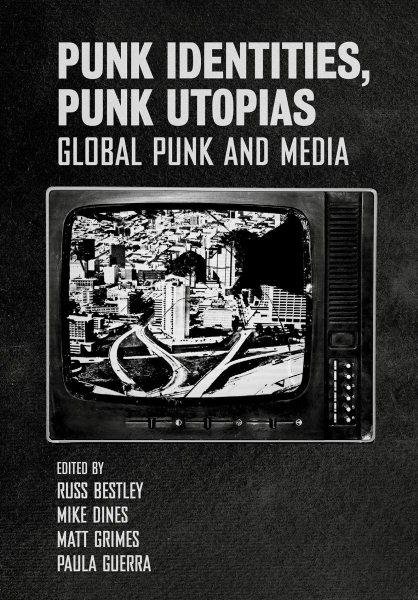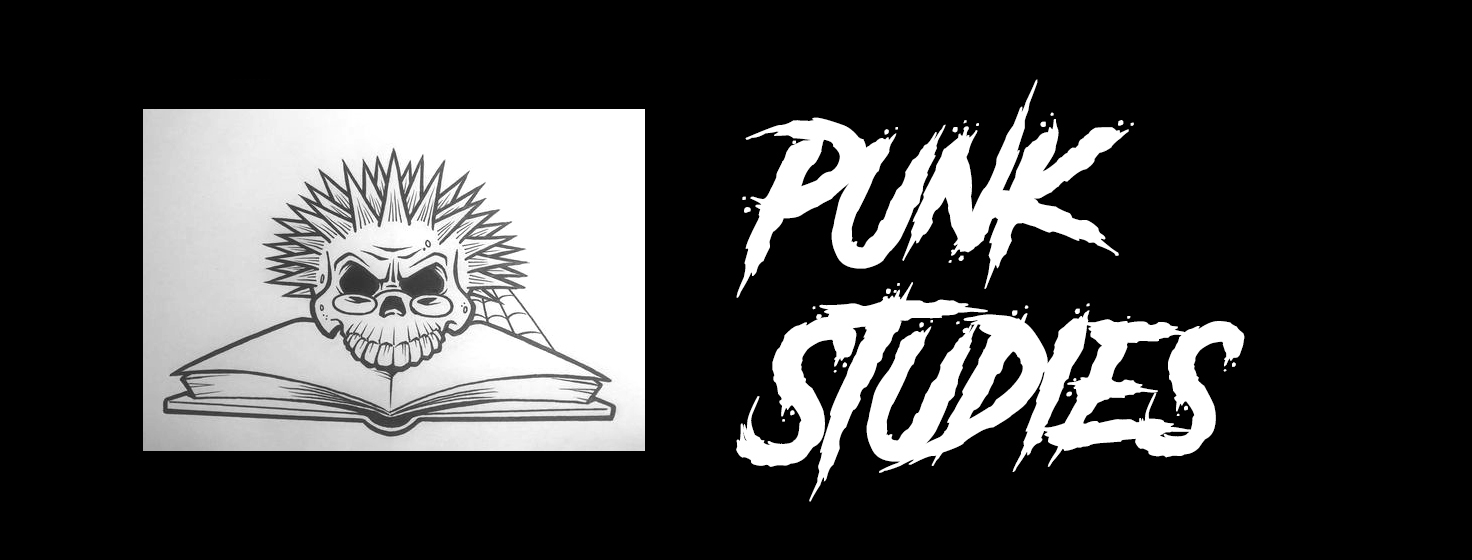
Punk Identities, Punk Utopias: Global Punk and Media, Russ Bestley, Mike Dines, Matt Grimes and Paula Guerra (eds) (2021), Bristol: Intellect Books, 260 pp., ISBN 978-1-78938-412-3, p/bk. £29.50
Reviewed by Anita Raghunath, Vrije University, Amsterdam
ath@vu.nl
Punk Identities, Punk Utopias: Global Punk and Media is the latest volume in what is fast becoming the go-to reference series for anyone either generally interested in punk as a cultural movement or as a resource for scholars who are working in the burgeoning academic field of punk studies. In fact the strength of the Punk Reader edited collections (which sit under the umbrella of the Global Punk book series), lies in their ability to open up a dialogue about the global impact of punk in contemporary culture, thus addressing the hitherto neglected importance of punk’s impact around the world in the last twenty years. The books are of particular importance to academics and researchers in revealing new areas of potential interdisciplinary research that is in a large part down to the broad field of editorial expertise in cultural studies, musicology, art and social sciences.
It is clear that the Punk Reader editors Bestley, Dines, Gordon, Grimes and Guerra, already leading academics in their own areas of punk studies, successfully collaborate to move punk research into new waters and, in their selection of articles, are instrumental in creating connections as well as highlighting contrasting views in contemporary punk research. The Global Punk book series makes it clear that punk is very much alive and that academia needs to work hard to keep pace with a fast-evolving scene. Taken as a whole, what the books also demonstrate is that we have come a long way from the work of the CCCS and Dick Hebdige and that the narrative of punk is a discourse that belongs to no one group. It is perhaps this over-arching sentiment that makes this series important for punk scholarship.
With that in mind, the most recent Punk Reader volume, Punk Identities, Punk Utopias: Global Punk and Media is an excellent collection of articles that contribute to this growing range of new perspectives on punk around the globe. The collection engages with some of the more contemporary and urgent social and political issues researched through a lens of punk counter culture, offering new insights into the ways in which punk endures as a platform for empowering marginal and marginalized identities. The articles in this volume offer some new interpretations of how punk subculture intersects with more nuanced questions about gender, feminism, ethnicity and specific national scenes and examines, in some instances, how these emergent perspectives are represented in new media and digital technology. One of the strengths of this particular collection is the way in which the editors have sought to bring research from different disciplines together in one volume. Whilst it, at first glance, can read as slightly disjointed in terms of overall theme, this text succeeds in highlighting the extraordinary multidisciplinary nature of punk in contemporary academic research. Each article in this collection reinforces this important element but the text is particularly strong in its foregrounding of feminist and gender issues. The three chapters that explore aspects of riot grrrl authored by Monica Schoop, Gabriela Clevesten Gelain and Mike Dines, and Steve Moog, whilst fascinating as discrete chapters, also clearly demonstrate the long reach of this aspect of punk and the centrality of this countercultural scene for women’s empowerment in very different geographic and cultural contexts. By presenting them concurrently in this text, the editors have offered the reader a valuable signpost that highlights the need for more focus on this potentially fruitful area of transnational and comparative feminist research.
Francis Stewart’s excellent analysis of the NI punk scene raises crucial and critical questions about the recovery of lost women’s voices and more generally poses questions around the lack of female representation in punk counterculture: a vital and long-neglected issue. A similar critical analysis is to be found in Matthew D. Newsom’s article on the Berlin psychobilly scene and the struggle for women’s representation within that group, which is also a welcome inclusion in this volume. Growing interest in the connection between the topics of gender and punk are raised in Greg Schott’s article which neatly complements this collection with his work on punk and its complex relationship with the contemporary trans scene.
The diasporic reach of punk links the remaining articles in this volume and the reader’s attention is drawn to the varied span of potential applications of punk in different disciplines and cultures. Donna McRae and Alexia Kannas explore the impact of punk on cinematic production and cultural memory in Melbourne, Australia while Mark Player delivers an outstandingly detailed examination of the importance of the DIY punk approach to Japanese film production in the work of one artist, Shôzin Fukui. More aspects of intercultural exchange within global punk movements are also examined in the articles by José Vicente Neglia, Lyndon Way and Dylan Wallace, and Lasse Ullven which, whilst examining the very different national contexts of Japan, Turkey and Finland respectively, all bring insights into some interesting and specific impacts of punk that are unique to their own social, political and cultural locations.
However, the most striking feature of this volume, and one that is arguably exemplified by the main theme of its final article by Yngvar Steinholt, is an engagement with the general discussion about the ubiquitous impact of punk as a global force for cultural change. This chimes with an important undercurrent in contemporary punk studies: namely the growing realization that, far from being able to define punk or indeed summarize its legacy in a neat way, punk is increasingly useful as a ‘plastic’ term that presents researchers from many disciplinary fields with an analytical framework that is challenging, interesting and adaptable.
The articles in this timely and important text underline this punk potentiality. Punk Identities, Punk Utopias: Global Punk and Media offers readers an opportunity to reconsider and re-frame punk as a discourse with surprisingly wide-reaching applications.

Trackbacks/Pingbacks